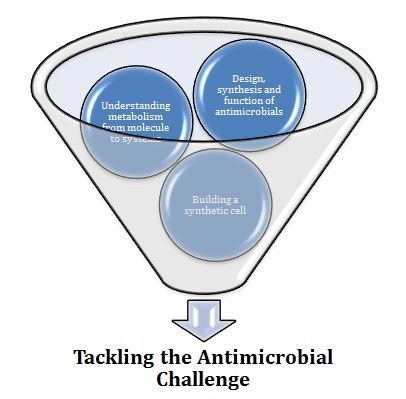About MLH
Focus
The theme Molecular Life and Health aims at top-notch research and education, pursuing detailed mechanistic understanding and exploitation of knowledge by concentrating on two levels:
- At the molecular level, through the discovery, design, and synthesis, targeted at the full functional and structural analysis of biomolecules/pharmaceuticals and complemented by translational studies to their use in combating antimicrobial resistance, in therapeutic interventions, and in nutrition, as well as using engineered (bio)catalysts for biobased applications
- At the (sub)cellular level, through i) (model-based) experimental analyses of biological systems and their mimics, ii) assembly of complex biological systems from basic molecular components, and iii) investigations of biologicals and biopharmaceuticals in model systems, novel methods are established for drug development and testing as well as to engineer cell-factories for bio-based applications.
Flagship programme
Infectious diseases account for a millions of deaths worldwide, whereas rapidly increasing numbers and widening distribution of pathogenic microbes that are resistant to antimicrobial drugs are current and cause serious threats to the successful treatment of many infectious diseases.
There are many reasons for this crisis, but the problem is severely aggravated by the lack of progress in antibiotic innovation during the past 25 years. As the need for novel antibiotics is hardly answered by private research, a natural and proactive role for academia and precompetitive public private partnerships is apparent. In addition, improved hygiene, infection prevention monitoring and control programs should reduce the risk of antimicrobial resistance.
The ultimate goal of the theme Molecular Life and Health is to Tackle the Antimicrobial Challenge. This flagship programme unites ample local expertise, efforts and results from core research to address this eminent societal problem.
Close collaborations with the University Medical Centre Groningen further enable the basic antimicrobial research to be integrated in (pre)clinical analysis and studies on the societal impact. Consequently, the research in Groningen is in an excellent position to execute this ambitious flagship program, acting in the very forefront in research and investing in educating young experts who will contribute in solving the antimicrobial crisis.

Key research
The joint future research with the theme Molecular Life and Health aims to unravel and exploit the molecular mechanisms underlying life and health in three main research topics:
- Building a synthetic cell
- Understanding cellular metabolism (including drug metabolism) from molecule to system
- Developing novel pharmaceuticals
- Technology-driven innovations
All efforts together funnel into the flagship programme Tackling the Antimicrobial Challenge.
| Last modified: | 31 January 2017 10.51 p.m. |
